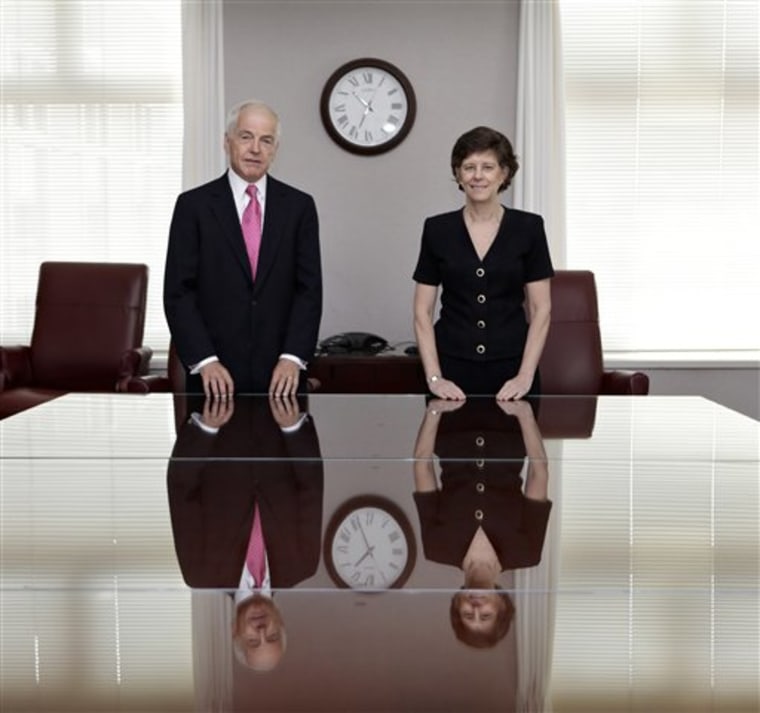Another Labor Day, another year of dysfunction in the agency that's supposed to protect workers from unfair labor practices and referee clashes between unions and management.
The enduring stalemate at the National Labor Relations Board, the longest in its history, comes as evidence that elections don't always settle political tugs of war. Ten months after the election of a president and Congress from the same party, no end is in sight to the deadlock.
Decisions are stalled on dozens of disputes that could set labor-management policies for decades to come. Can employers prohibit employers from using the company's e-mail system to send union-related messages? Where may union members distribute literature at work sites? What about organizing a union by simply signing cards instead of having a secret-ballot election?
These matters and more are going nowhere because the board, since January 2008, has had one lonely Democrat, one lonely Republican and a political stalemate over three empty seats.
"The only cases they are getting out are the pure vanilla cases, where it's abundantly clear the case should go one way," said former board Chairman Robert Battista, a Bush appointee who now is an attorney in private practice.
‘Out of the mainstream’
The problem began when the Democratic-controlled Senate refused to fill the vacant seats during President George W. Bush's final year in office, angered over a series of board rulings that Democrats considered anti-labor.
Those vacancies have lingered into President Barack Obama's first term, despite the Democrats being in power in the White House and Congress. Obama nominated three new members to sit on the board last month, but the U.S. Chamber of Commerce quickly demanded a rare hearing on one of them, former union lawyer Craig Becker, calling his views "out of the mainstream." The chamber is a powerful lobby that regularly does battle with unions and is influential with many lawmakers, particularly Republicans.
It's not clear when lawmakers will consider the appointments or whether a hearing will be set. Given the likelihood that an Obama board will reverse several Bush-era precedents, Republicans may be in no rush.
With just two members, the board has ruled on more than 480 cases in which the chairwoman, Democrat Wilma Liebman, and Republican board member Peter Schaumber can agree. They have put off dealing with about 50 more contentious cases that are being closely watched by both business and labor.
"Employers are wary of what to do, lest the law change again," said Peter Conrad, a New York labor lawyer who represents businesses.
Even the "pure vanilla" cases are not without dispute. Earlier this year, the U.S. Court of Appeals for the D.C. Circuit threw into doubt the validity of every decision the board's two members have issued since January 2008. The court said federal law does not permit the board to act without a quorum of three members, a ruling that only adds to the uncertainty.
At least two other federal appeals courts have reached the opposite conclusion, though, and the Supreme Court is expected to weigh in to resolve the split. Meanwhile, the agency is continuing to issue decisions.
‘Every appointment is a battleground’
Liebman, whom Obama elevated to lead the board earlier this year, says all the uncertainty is frustrating.
"It would be nice if the process worked the way it's supposed to work, which is once a year someone is supposed to get renewed so you don't have these long vacancies," she said. "Every appointment is a battleground."
Instead, the politicized nature of appointments has forced presidents to put up packages of two or three nominees at once that include both Democrats and Republicans. That's meant to grease the process.
Along with Becker, Obama wants to fill the other empty seats with Mark Pierce, a Democratic labor lawyer, and Brian Hayes, a Republican who is the GOP's labor policy director on the Senate Health, Education, Labor and Pensions committee.
The U.S. Chamber of Commerce has criticized Becker for asserting in a law review article that employers should have no legal role to play in whether their employees seek to organize a union.
The chamber is also concerned that Becker could try to circumvent Congress on the volatile issue of whether it should be easier for workers to organize unions. Unions want lawmakers to pass the Employee Free Choice Act, which would let workers form unions by signing cards instead of voting by secret ballot. Unions say businesses often try to intimidate workers in the days leading up to an election.
Business groups adamantly oppose the bill, saying it would let union leaders bully workers into signing up.
The bill has stalled in Congress without the support of some Democrats. If it doesn't pass, some Republicans fear Becker could try to achieve the same result through board action.
